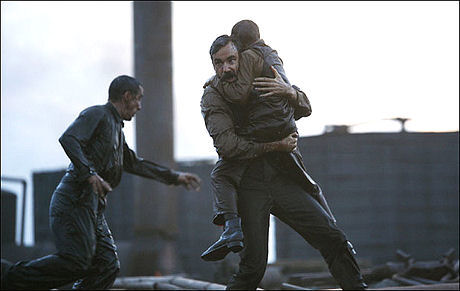Calling There Will Be Blood “an obsessive, almost microscopically observed study of an extreme sociopath who determinedly destroys his ties to other human beings,” Variety‘s Todd McCarthy says it “marks a significant departure in the work of Paul Thomas Anderson. Heretofore fixated on his native Los Angeles and most celebrated for his contempo ensemblers, writer-helmer this time branches out with an intense, increasingly insidious character study of a turn-of-the-century central California oil man.

Zeroing in on the soul of a maliciously single-minded entrepeneur “is an odd theme on which to build a big movie, especially in view of the extreme manner in which it ends; one can only guess at Anderson’s personal reasons for dwelling on it with such unremitting fervor. But his commitment to going all the way must be respected in the face of conventional commercial considerations.
Daniel Day-Lewis‘ Daniel Plainview character “is a profoundly anti-social fellow, malevolently so, and There Will Be Blood devotes itself to scratching, peeling and digging away at a man determined to divest himself of his past and everyone associated with it.
“There’s no getting around the fact that this Paramount Vantage/Miramax co-venture reps yet another 2 and 1/2 hour-plus indie-flavored, male-centric American art film, a species that has recently proven difficult to market to more than rarefied audiences. Distribs will have to roll the dice and use hoped-for kudos for the film and its superb star to create the impression of a must-see.
“Officially penning an adaptation for the first time, Anderson turns out to have been inspired very loosely indeed by his source, Upton Sinclair‘s 1927 novel “Oil!” Pic betrays little of the tome’s overview and virtually none of socialist Sinclair’s muckraking instincts. Instead, it is more interested in language, and in the twinned aspects of industry and religion on the landscape of American progress.
“The film’s zealous interest in a man so alienated from his brethren can be alternately read as a work abnormally fascinated by cold, antisocial behavior, or as a deeply humanistic tract on the wages of misanthropy.
“Either way, Anderson has embraced his study of a malign man intimately, as has Day-Lewis, who, as always, seems so completely absorbed in his role that it’s difficult to imagine him emerging between takes as just an actor playing a part. Daniel is a man who will stop at nothing to achieve the unnatural state of becoming an island onto himself, and Day-Lewis makes him his own.









